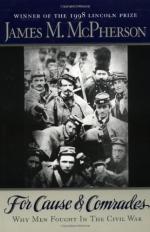
|
| Name: _________________________ | Period: ___________________ |
This quiz consists of 5 multiple choice and 5 short answer questions through Chapter 2, We Were in Earnest.
Multiple Choice Questions
1. In his discussion of his ancestor, Jesse Beecher, McPherson says that in 1862 Beecher enlisted with the 112th New York at what age?
(a) 43.
(b) 37.
(c) 19.
(d) 25.
2. While talking about historically and politically famous individuals who fought the Civil War, McPherson mentions which of the following Ohio Republican leaders?
(a) Rutherford B. Hayes.
(b) James A. Garfield.
(c) William McKinley.
(d) Ulysses S. Grant.
3. In his discussion of duty, what does McPherson say Confederate soldiers are more likely to speak of?
(a) Reputation.
(b) Family.
(c) Honor.
(d) Class.
4. After the attack on Fort Sumter, all BUT WHICH of the following states joined the other seven Southern states that had seceded prior to April, 1861?
(a) Tennessee.
(b) North Carolina.
(c) Indiana.
(d) Virginia.
5. When an immigrant worker in a Philadelphia textile mill wrote to his father to explain his enlistment, he said if secession were allowed, the United States might end up worse than what country?
(a) Ireland.
(b) Poland.
(c) Russia.
(d) Germany.
Short Answer Questions
1. During his visit to the four Civil War battlefields near Fredericksburg, McPherson thinks about the fighting that happened on May 12, 1864; for how many hours did the battle last?
2. When discussing the movie "Gettysburg" and the novel "The Killer Angels," McPherson mentions which man who won the medal of honor for defending Little Big Top?
3. When McPherson says that grousing about war has long been a soldier's privilege, he notes an officer from which state who wrote that these "soldiers will fight like bull dogs"?
4. How many children does McPherson report that Jesse Beecher had when he enlisted with the 112th New York in 1862?
5. As McPherson discusses the initial impulse that prompted men to enlist on both sides after the raid on Fort Sumter he references which of the following French terms?
|
This section contains 298 words (approx. 1 page at 300 words per page) |

|




